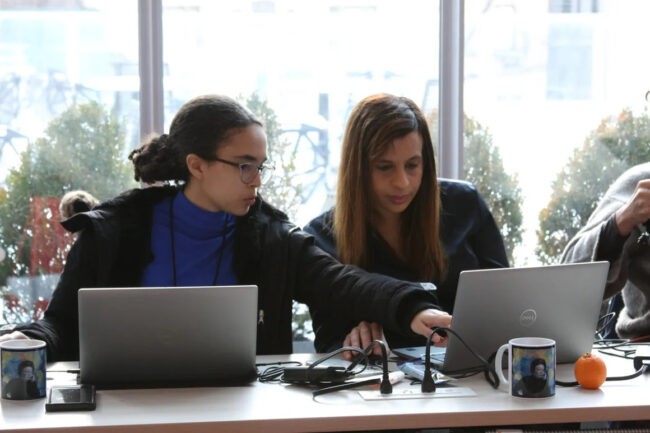Girl Talk Is Making Waves
In honor of International Women’s Day, we highlight a new workshop that engages women of all backgrounds in ocean sciences.
March 8 is International Women’s Day—a global celebration of the achievements of women and a clarion call for gender equality. This year’s theme is “Invest in women: Accelerate progress,” with a focus on ending poverty, implementing gender-responsive financing, shifting to a green economy and care society and funding feminist change-makers.
Vicki Ferrini personifies the notion of investing in women. She is a marine geophysicist and a senior research scientist and geoinformatics expert at Lamont-Doherty Earth Observatory, and she also heads the Atlantic and Indian Oceans portion of Nippon Foundation-GEBCO Seabed 2030 Project, which aims to map the entire ocean floor by the end of the decade. But Ferrini’s contributions to science extend beyond her own research—with her new data-mapping workshop Girl Talk, Ferrini hopes to engage girls, women and gender non-conforming individuals in careers in ocean sciences. In the workshop, students focus on mapping and geospatial visualization through foundational knowledge, while exploring career opportunities and enjoying direct connections to the growing network and culture of multi-generational women inspiring women in ocean mapping.
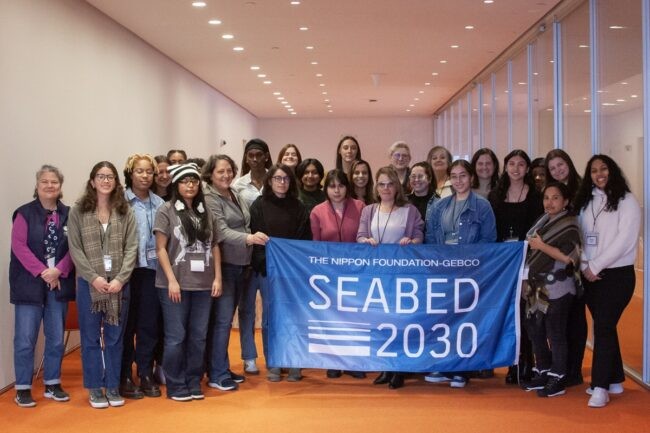
Ferrini’s research has taken her around the world to map the seafloor from shallow waters to the deep sea, using everything from ships and boats to submersibles and towed platforms. She hopes to use her position to open doors for women of all backgrounds. “We don’t have to make spaces that are exclusively female,” Ferrini says, “but we must change the way we run the meeting so we don’t have any one person taking up all the air in the room.” State of the Planet spoke with Ferrini about the genesis of Girl Talk, who participated in the program, and why it’s so important to decentralize the field of ocean mapping.
Why did you create Girl Talk?
For a long time, I’ve thought about having students work together to process and publish the data we use to map the global seafloor. If we’re going to map the ocean, which is an enormous undertaking, we need to decentralize the effort. We need to share the knowledge, tools and data and grow a large community of collaborators. Equity and the practice of decentralizing and empowering many people is the core of modern feminism, and is also the foundation of Girl Talk. It’s the way I run my research group, the Ferrini Data Collaboratory, and is a common theme across all my other projects.
Our funder, Every Page Foundation, helped bring Girl Talk into focus by encouraging additional efforts to recruit and include diverse women. Every Page Foundation works to advance gender equity in the arts and sciences, by prioritizing both the health and security of women and girls and their educational opportunities and career development. Their vision of a gender-equal world is one in which women and girls are included on “every page” of society.
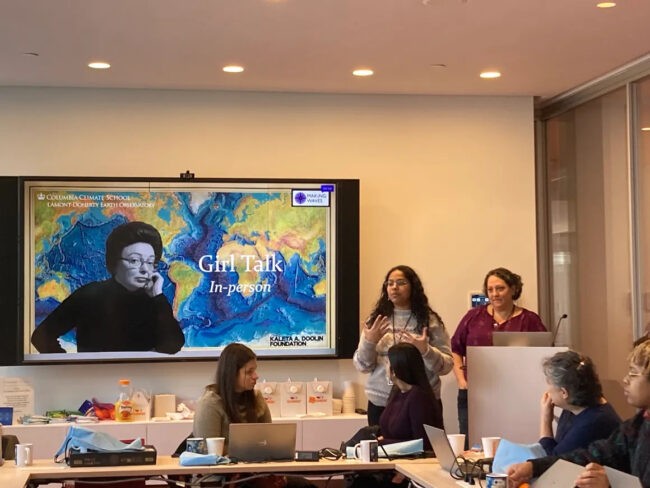
Why the name Girl Talk?
In the early 1950s, Marie Tharp was a Lamont geologist working on mapping the seafloor, which at the time was thought to be mostly flat. Tharp’s maps revealed that the seafloor is covered in canyons, ridges and mountains, but since this challenged the scientific establishment, her findings were initially dismissed as “girl talk.” Tharp’s work has since been referred to as the spark that ignited the plate tectonics revolution and our understanding of how nearly everything on the planet works. We’re reclaiming and redefining the term to empower the rising generation of women and gender non-conforming people to explore and pursue careers in science, technology, engineering, arts and math.
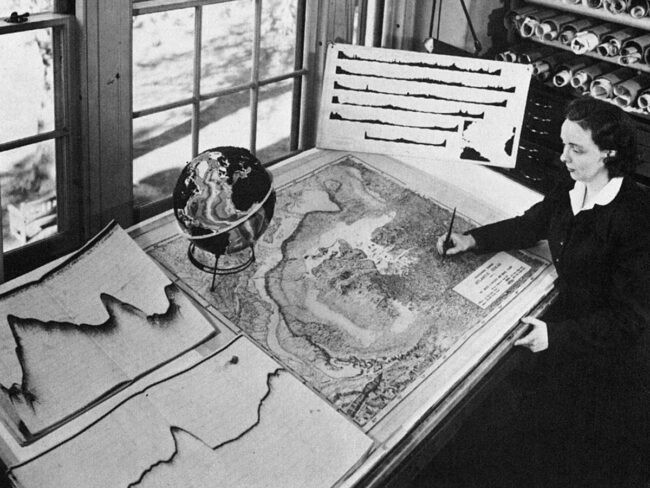
Who are the women leaders that you brought together for Girl Talk?
Our workshop speakers were women who do different aspects of ocean mapping, from data acquisition to using the data as scientists to working on the software that helps make the data accessible. We brought in federal employees, academics, industry representatives, independent contractors, people who have been on marine research vessels all over the world. Everyone was passionate about what they do and they took the participants on an awesome journey, showing the opportunities for travel and exploring the world while doing a job. Speakers shared their meandering career path stories, including their successes and failures, in the most vulnerable and authentic ways. They went deep and put it all out there, and this honest, open conversation set the stage for an amazing in-person experience.
In the first session, Marie Tharp-ophile Dawn Wright, who is chief scientist of Esri—a company that makes geographic information system (GIS) software—set the tone by telling participants that they were now part of the family of women working together. As incredibly busy as Dawn is, she still took the time to respond to many emails from participants during the workshop.
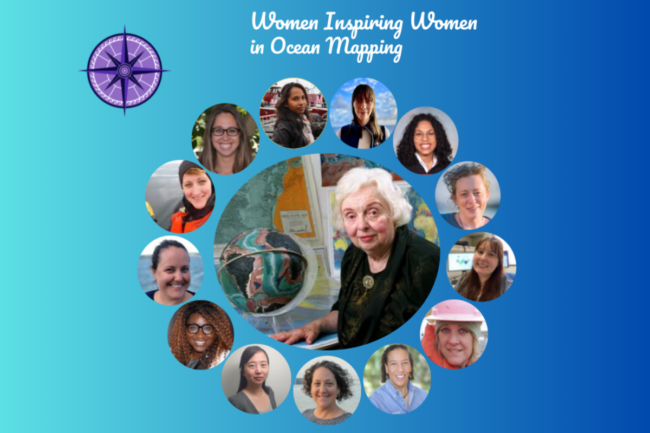
Who were the participants?
We wanted to engage as diverse a community as possible, including those who may not have been exposed to the ocean sciences as a career path. In particular, we focused on undergraduate institutions in the New York City area such as The City College of New York; Queens College, CUNY; and the New York City College of Technology (CityTech). Through our network of women in the field, we ultimately engaged undergraduates, graduate students, and even those who already have masters degrees as participants.
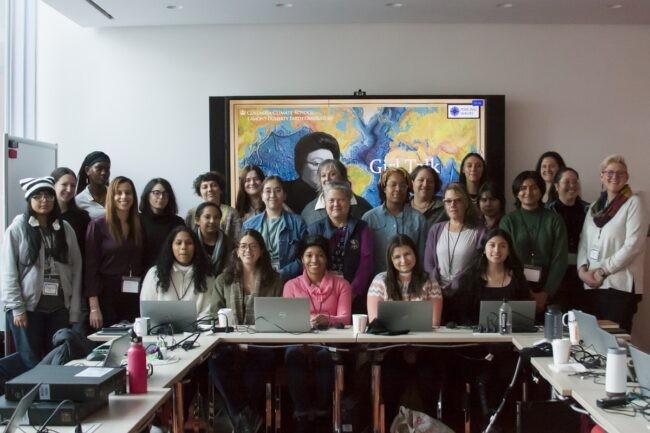
What did participants learn?
By way of introduction, participants learned about Marie Tharp, what ocean mapping is, how we map the ocean, and why it’s important.
They then learned how to process ocean mapping data using industry standard tools and contribute to global mapping efforts, while gaining foundational knowledge in GIS. They also used GeoMapApp and GMRT, which are tools and techniques we developed at Lamont to increase accessibility of marine geoscience data. This gave them a broad toolkit to approach a huge amount of complementary data and explore multiple aspects of the global ocean.
Participants processed data culled from two research cruises in the Pacific Ocean, encompassing a collective area of 91,599 square kilometers. They shared their work in two citable data publications while contributing to Seabed 2030. They also created interactive Story Maps to share what they learned during the program.
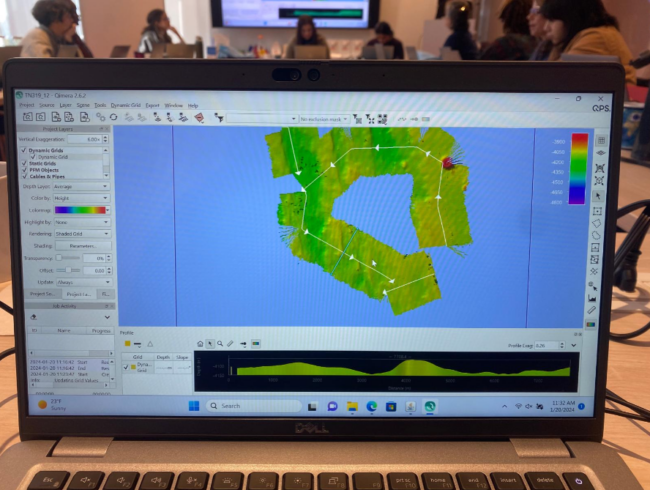
The program also connected participants with amazing women leaders to learn about their work, career path stories and opportunities in the field. Whether or not they pursue a career in ocean sciences, participants gained inspiration and confidence.
The program exceeded all of our expectations, and we hope to repeat it locally as well as scale it to include more groups and locations.
How would you connect Girl Talk with this year’s International Women’s Day theme of “Invest in women: Accelerate progress”?
Creating spaces where women have confidence and feel assured that they will not be shushed and questioned is essential to accelerating progress in gender equality. That’s the essence of what Girl Talk is all about, and what we strive to do in all of our work.
